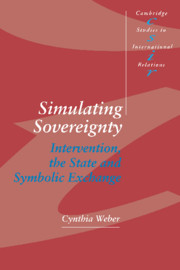Book contents
- Frontmatter
- Contents
- Preface
- Acknowledgments
- 1 Writing the state
- 2 Examining the sovereignty/intervention boundary
- 3 Interpretive approaches
- 4 Concert of Europe interventions in Spain and Naples
- 5 Wilson Administration actions in the Mexican and Bolshevik revolutions
- 6 United States invasions of Grenada and Panama
- 7 Symbolic exchange and the state
- Notes
- References
- Index
- Titles in the series
4 - Concert of Europe interventions in Spain and Naples
Published online by Cambridge University Press: 30 September 2009
- Frontmatter
- Contents
- Preface
- Acknowledgments
- 1 Writing the state
- 2 Examining the sovereignty/intervention boundary
- 3 Interpretive approaches
- 4 Concert of Europe interventions in Spain and Naples
- 5 Wilson Administration actions in the Mexican and Bolshevik revolutions
- 6 United States invasions of Grenada and Panama
- 7 Symbolic exchange and the state
- Notes
- References
- Index
- Titles in the series
Summary
Invention is the enemy of history which knows only discovery, and only that which exists can be discovered.
MetternichWhen representing the sovereign authority within a state, who is to be represented? Prior to the French Revolution, questions pertaining to the legitimate foundation of stately authority did not arise for, as all knew, the sole authority of the sovereign state was the monarch. Dynastic sovereignty held sway over continental Europe as late as 1789. Yet by 1787, this self-evident truth which needed no elaboration or justification became the subject of formal pronouncement, as illustrated by a speech made by King Louis XVI's Keeper of the Seals to the French Parliament:
These principles, universally recognized by the Nation to be true, attest that to the King alone belongs the Sovereign power in his kingdom;
That he is accountable only to God for the exercise of the supreme power;
That the bond uniting the King and the Nation is by nature indissoluble;
That interests and duties that are reciprocal between the King and his subjects do nothing else than to assure the perpetuity of this union;
That the Nation's interests require that the rights of its Chief suffer no alteration;
That the King is Sovereign Chief of the Nation and one with the Nation;
Finally, that the legislative power resides in the person of the Sovereign, independently and without partition.
Gentlemen, such are the unchanging principles of the French Monarchy …
(Speech made on 19 November 1787, quoted in Beik, 1970:2).Just two years later, Emmanuel Joseph Sièyes in his famous pamphlet “What is the Third Estate?” equated common citizens with the nation.
- Type
- Chapter
- Information
- Simulating SovereigntyIntervention, the State and Symbolic Exchange, pp. 40 - 60Publisher: Cambridge University PressPrint publication year: 1994



